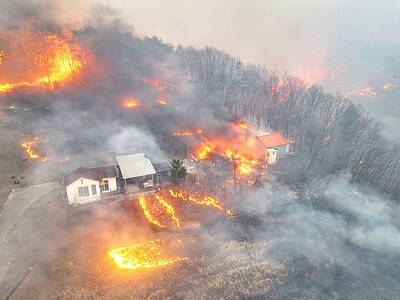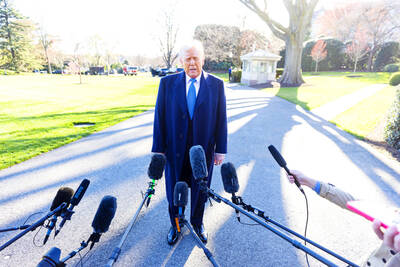China wants the US and Russia to begin curtailing their nuclear arsenals before it negotiates over its much smaller nuclear force, the leading members of an international disarmament panel said yesterday.
“China’s basic position is that it’s up to others to make the first move in this respect, in particular the United States and Russia,” said Gareth Evans, a former Australian foreign minister, after a meeting of the International Commission on Nuclear Non-proliferation and Disarmament in Beijing.
“There was some reluctance on the Chinese side to go much further at this stage,” he told a news conference.
Evans and Yoriko Kawaguchi, a former Japanese foreign minister, jointly lead the commission, funded by their governments, which is exploring ways to reverse the spread of nuclear weapons and will produce a report for world leaders.
They also met Chinese Foreign Minister Yang Jiechi (楊潔箎) to discuss the panel’s work.
The commission’s goals gained a boost from US President Barack Obama’s vow that the US was ready to lead steps by all states with atomic weapons to reduce their arsenals.
A conference on the nuclear Non-Proliferation Treaty (NPT) also recently defied expectations when the 189 signatories unanimously agreed an agenda for a major review next year.
But those moves have also raised attention on how China, with a much smaller nuclear arsenal than the US or Russia, will handle disarmament expectations. Tokyo has pressed Beijing to cut atomic weapons, and Evans said Washington is also eager to open up talks with China on nuclear weapons.
Kawaguchi said the issues brought “heated” discussion among the experts and officials from across the northeast Asia region attending the Beijing meeting.
China holds about 240 nuclear warheads, compared to the 9,400 held by the US and 13,000 held by Russia, the Federation of American Scientists recently estimated.
But the Pentagon has said China is the only major nuclear power still expanding its arsenal. The People’s Liberation Army has been deploying new ballistic missiles and developing a generation of atomic submarines capable of launching missiles with nuclear warheads, observers have said.
Evans said it was unrealistic to expect China to scale back its nuclear force soon, but Beijing could help disarmament by being more candid about the size of its atomic arsenal and the doctrine governing its possible use.
“Realistically, it’s a necessary precondition of anything much more happening [regarding China] that we see some initial movement in the US-Russia talks,” Evans said.
China held its first nuclear test explosion in 1964 and acceded to the NPT in 1992.

DEATH CONSTANTLY LOOMING: Decades of detention took a major toll on Iwao Hakamada’s mental health, his lawyers describing him as ‘living in a world of fantasy’ A Japanese man wrongly convicted of murder who was the world’s longest-serving death row inmate has been awarded US$1.44 million in compensation, an official said yesterday. The payout represents ¥12,500 (US$83) for each day of the more than four decades that Iwao Hakamada spent in detention, most of it on death row when each day could have been his last. It is a record for compensation of this kind, Japanese media said. The former boxer, now 89, was exonerated last year of a 1966 quadruple murder after a tireless campaign by his sister and others. The case sparked scrutiny of the justice system in

DITCH TACTICS: Kenyan officers were on their way to rescue Haitian police stuck in a ditch suspected to have been deliberately dug by Haitian gang members A Kenyan policeman deployed in Haiti has gone missing after violent gangs attacked a group of officers on a rescue mission, a UN-backed multinational security mission said in a statement yesterday. The Kenyan officers on Tuesday were on their way to rescue Haitian police stuck in a ditch “suspected to have been deliberately dug by gangs,” the statement said, adding that “specialized teams have been deployed” to search for the missing officer. Local media outlets in Haiti reported that the officer had been killed and videos of a lifeless man clothed in Kenyan uniform were shared on social media. Gang violence has left

‘HUMAN NEGLIGENCE’: The fire is believed to have been caused by someone who was visiting an ancestral grave and accidentally started the blaze, the acting president said Deadly wildfires in South Korea worsened overnight, officials said yesterday, as dry, windy weather hampered efforts to contain one of the nation’s worst-ever fire outbreaks. More than a dozen different blazes broke out over the weekend, with Acting South Korean Interior and Safety Minister Ko Ki-dong reporting thousands of hectares burned and four people killed. “The wildfires have so far affected about 14,694 hectares, with damage continuing to grow,” Ko said. The extent of damage would make the fires collectively the third-largest in South Korea’s history. The largest was an April 2000 blaze that scorched 23,913 hectares across the east coast. More than 3,000

‘INCREDIBLY TROUBLESOME’: Hours after a judge questioned the legality of invoking a wartime power to deport immigrants, the president denied signing the proclamation The US on Friday said it was terminating the legal status of hundreds of thousands of immigrants, giving them weeks to leave the country. US President Donald Trump has pledged to carry out the largest deportation campaign in US history and curb immigration, mainly from Latin American nations. The order affects about 532,000 Cubans, Haitians, Nicaraguans and Venezuelans who came to the US under a scheme launched in October 2022 by Trump’s predecessor, Joe Biden, and expanded in January the following year. They would lose their legal protection 30 days after the US Department of Homeland Security’s order is published in the Federal